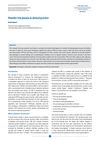 3 citations,
January 2016 in “South African family practice”
3 citations,
January 2016 in “South African family practice” Platelet-rich plasma is considered safe but needs more research to prove its effectiveness in medical treatments.
 1 citations,
January 2008 in “Elsevier eBooks”
1 citations,
January 2008 in “Elsevier eBooks” The document concludes that various disorders can cause hair loss in dogs, each requiring different treatments, and some may heal on their own.
[object Object]  April 2017 in “Australasian Journal of Dermatology”
April 2017 in “Australasian Journal of Dermatology” Most patients with Lichen planopilaris improved with acitretin, but treatments often didn't work well; preventing infection in skin surgery is important, and bupivacaine might be a better anesthetic.
 June 2008 in “Springer eBooks”
June 2008 in “Springer eBooks” The document concludes that permanent hair loss conditions are complex, require early specific treatments, and "secondary permanent alopecias" might be a more accurate term than "secondary cicatricial alopecia."
 467 citations,
October 2014 in “European Journal of Endocrinology”
467 citations,
October 2014 in “European Journal of Endocrinology” The European Society of Endocrinology advises individualized long-term management for PCOS, focusing on lifestyle changes, accurate diagnosis, and treatments for associated health risks and symptoms.
 42 citations,
July 2015 in “Journal of The American Academy of Dermatology”
42 citations,
July 2015 in “Journal of The American Academy of Dermatology” The conclusion is that oral contraceptives and antiandrogens can treat hirsutism and acne in women with cutaneous hyperandrogenism, but more research is needed for effective treatments, especially for hair loss.
 30 citations,
June 2015 in “British Journal of Dermatology”
30 citations,
June 2015 in “British Journal of Dermatology” Acne is common in women, often hormone-related, negatively affects quality of life, and requires various treatments.
 23 citations,
August 2012 in “Veterinary dermatology”
23 citations,
August 2012 in “Veterinary dermatology” Skin infections in cats are more common than thought, often affect young cats with allergies, and need better treatments.
 22 citations,
September 2018 in “Medical Clinics of North America”
22 citations,
September 2018 in “Medical Clinics of North America” Facial aging is caused by natural processes and external factors, and can be managed with preventative measures and a variety of treatments tailored to individual needs.
 9 citations,
July 1995 in “Veterinary Clinics of North America: Small Animal Practice”
9 citations,
July 1995 in “Veterinary Clinics of North America: Small Animal Practice” The document concludes that hair loss in cats is caused by various factors, including allergies, mites, infections, and hormonal issues, with treatments varying accordingly.
 5 citations,
December 2011 in “InTech eBooks”
5 citations,
December 2011 in “InTech eBooks” Eat antioxidant-rich foods, reduce fast food, and explore various treatments for vitiligo.
 July 2018 in “Elsevier eBooks”
July 2018 in “Elsevier eBooks” Up to half of people experience itchy scalp, often due to skin conditions like seborrheic dermatitis or psoriasis, and treatments vary based on the specific cause.
 January 2011 in “Elsevier eBooks”
January 2011 in “Elsevier eBooks” Alopecia in animals can be hereditary, congenital, or acquired, with treatments and outcomes varying widely.
 April 1982 in “Journal of The American Academy of Dermatology”
April 1982 in “Journal of The American Academy of Dermatology” Retinoids help treat psoriasis effectively, but they can cause side effects and need more research on safe use with other treatments.
 April 1981 in “Postgraduate Medicine”
April 1981 in “Postgraduate Medicine” In 1981, the punch graft technique was the main method for hair transplantation, and medical treatments for baldness were not very effective.
Some alternative treatments for vitiligo show promise but need more research to confirm their safety and effectiveness.
 38 citations,
February 2016 in “Surgery Journal”
38 citations,
February 2016 in “Surgery Journal” Facial plastic surgery has evolved to focus on less invasive techniques and innovative technologies for cosmetic and reconstructive procedures.
 126 citations,
April 2015 in “Clinical, cosmetic and investigational dermatology”
126 citations,
April 2015 in “Clinical, cosmetic and investigational dermatology” Choosing the right patients, using proper techniques, and having thorough knowledge are key to preventing and managing dermal filler complications.
 44 citations,
June 1985 in “Fertility and sterility”
44 citations,
June 1985 in “Fertility and sterility” Combination drug therapy is effective for hirsutism that doesn't improve with just one medication.
 43 citations,
November 2007 in “Journal of Investigative Dermatology Symposium Proceedings”
43 citations,
November 2007 in “Journal of Investigative Dermatology Symposium Proceedings” The document concludes that proper diagnosis and treatment of common scalp disorders are important for both physical and psychological health.
[object Object]  28 citations,
October 2018 in “Clinical Obstetrics and Gynecology”
28 citations,
October 2018 in “Clinical Obstetrics and Gynecology” Testosterone therapy seems safe and effective for transgender men with proper care, but more long-term research is needed.
 22 citations,
January 2017 in “Dermatology”
22 citations,
January 2017 in “Dermatology” Spironolactone is effective and safe for treating acne with minimal side effects.
 20 citations,
June 2012 in “Human Reproduction”
20 citations,
June 2012 in “Human Reproduction” Women with polycystic ovarian syndrome are more likely to have cervical insufficiency, especially South Asian and Black women.
 14 citations,
October 2019 in “International Journal of Women's Health”
14 citations,
October 2019 in “International Journal of Women's Health” Menopausal acne is treated with medications and lifestyle changes, but careful choice is needed due to side effects.
 7 citations,
April 2011 in “Expert review of dermatology”
7 citations,
April 2011 in “Expert review of dermatology” The document concludes that patients with skin of color need specialized dermatological care and education to manage unique skin conditions effectively.
 4 citations,
December 2021 in “Experimental and Therapeutic Medicine”
4 citations,
December 2021 in “Experimental and Therapeutic Medicine” Adult female acne is complex and requires a combination of treatments for effective management.
 3 citations,
August 2019 in “Journal of The American Academy of Dermatology”
3 citations,
August 2019 in “Journal of The American Academy of Dermatology” Higher doses of spironolactone may improve acne in PCOS patients, but side effects are a concern.
 1 citations,
April 2023 in “Frontiers in Immunology”
1 citations,
April 2023 in “Frontiers in Immunology” New treatments for hair loss from alopecia areata may include targeting immune cells, using stem cells, balancing gut bacteria, applying fatty acids, and using JAK inhibitors.
 1 citations,
March 2023 in “Clinical, Cosmetic and Investigational Dermatology”
1 citations,
March 2023 in “Clinical, Cosmetic and Investigational Dermatology” Current treatments for Alopecia Areata have mixed success, and there's a need for better, more accessible options and support for affected individuals.
 August 2024 in “Nutrition Bulletin”
August 2024 in “Nutrition Bulletin” GLP-1 receptor agonists help with weight loss but need to be combined with other treatments for best results.





























